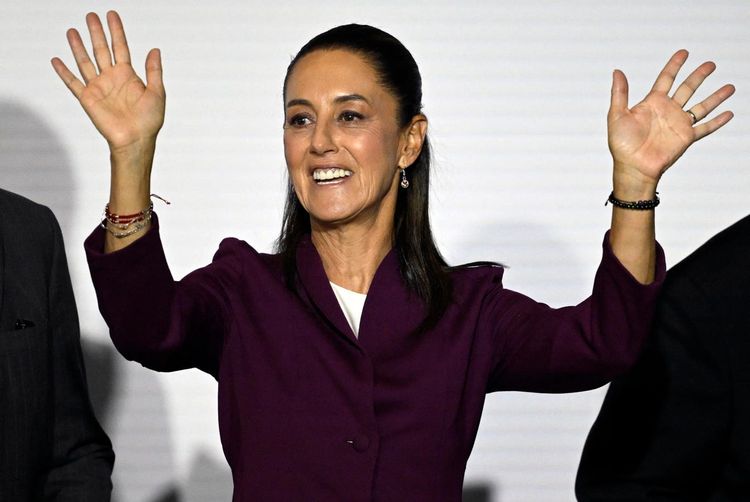Claudia Sheinbaum Makes History As First Female President Of Mexico

Mexico is set to have its first female president in the person of Claudia Sheinbaum. Her historic victory is set to be celebrated by many, and it serves as an inspiration to women everywhere who aspire to occupy high-ranking positions such as the presidency. Claudia Sheinbaum’s win is a recognition of her capabilities and a testament to the fact that gender does not determine competence. With her leadership skills, experience, and credentials, she is fully deserving of the honor that has been conferred upon her, and we wish her all the best as she embarks on this new journey. This is a milestone achievement for Mexico, and it sends a powerful message of hope and progress to the world.
Yesterday marked a historic moment for Mexico as Claudia Sheinbaum was elected as the country's first-ever female president. Impressively, she secured almost 60% of the votes, the highest percentage in Mexico's democratic history based on initial reports from the electoral authority.
Sheinbaum, who previously served as the mayor of Mexico City and was supported by the current President Andrés Manuel López Obrador, emerged as the representative for the leftist Morena party. With a Ph.D. in energy engineering, she has authored multiple publications about energy and the environment, including two books and over a hundred articles. She was also a member of a United Nations team of climate scientists who received the Nobel Peace Prize. Sheinbaum's term as governor of Mexico City will begin on October 1 and will last for six years.
Women in Mexico were granted the right to vote and run for office in national elections in 1953. It has been 71 years since then, and for the first time in history, a woman is slated to assume the country's highest office. Claudia Sheinbaum is all set to become the next president, with Xóchitl Gálvez, another woman, being her closest contender in the primaries. This is a significant milestone in Mexico's political landscape, and it highlights the growing role of women in leadership positions.
The increase in female leaders in politics can be attributed to the strict quotas set by the government. These quotas were intensified and enforced in 2019 through a constitutional reform, which mandated equal gender representation across all branches of government. Specifically, political parties were required to nominate an equal number of men and women for executive, legislative, and judicial positions. This is easier in Mexico due to the party system empowering parties in candidate selection compared to the United States' open primaries.
The establishment of gender quotas has significantly improved women's ability to attain political power in Mexico. Over the span of almost 30 years, the percentage of women in Congress has skyrocketed from 15% in 1994 to a gender-balanced 50% in 2023. In certain parts of the country, women have even been appointed as governors for the first time. Mexico ranks fourth in the world for having female representatives in parliament, with the United States lagging behind at 72nd place, which is on par with Iraq.
Mexico has achieved notable progress for women outside of the realm of politics. Particularly significant is the country's Supreme Court's decision to legalize abortion in 2023, which followed the United States' Supreme Court's decision to overturn Roe v. Wade in 2022. The World Economic Forum, which evaluates countries based on gender-based disparities in education, health, economic opportunities, and political leadership, ranked Mexico at 33rd place, ahead of the United States, which ranked 43rd.
Although women have made strides in political representation, studies show that the rate of femicide in Mexico is increasing. The World Health Organization defines femicide as the deliberate murder of women specifically because they are female. Experts believe that the prevalence of "machismo" culture is the root cause of high femicide rates in the country. This culture indirectly promotes male dominance in households and encourages the use of violence against female partners and spouses.
Femicide is considered a unique offense in Mexico. During the time when Sheinbaum was the mayor in 2019, a specialized prosecutor’s office was formed to handle cases related to femicide in Mexico City. Nevertheless, violence continues to be a big problem all over the nation, with an average of 30,000 homicides each year since 2018. This rate of violence makes López Obrador’s presidency the most violent period ever recorded in Mexico, which would be a huge obstacle for Sheinbaum to handle as she begins her term as the president of Mexico.
With Sheinbaum's victory, Mexico joins the increasing number of countries with women at the forefront. A recent study by Pew Research in 2023 examined member nations in the United Nations and found that 59 countries have had a female leader elected at least once. Out of these countries, only 14 have had more than one female leader, and a small number of six have had multiple female leaders. The nation with the highest number of female leaders is Switzerland, with five, although it regularly holds elections every year.













































